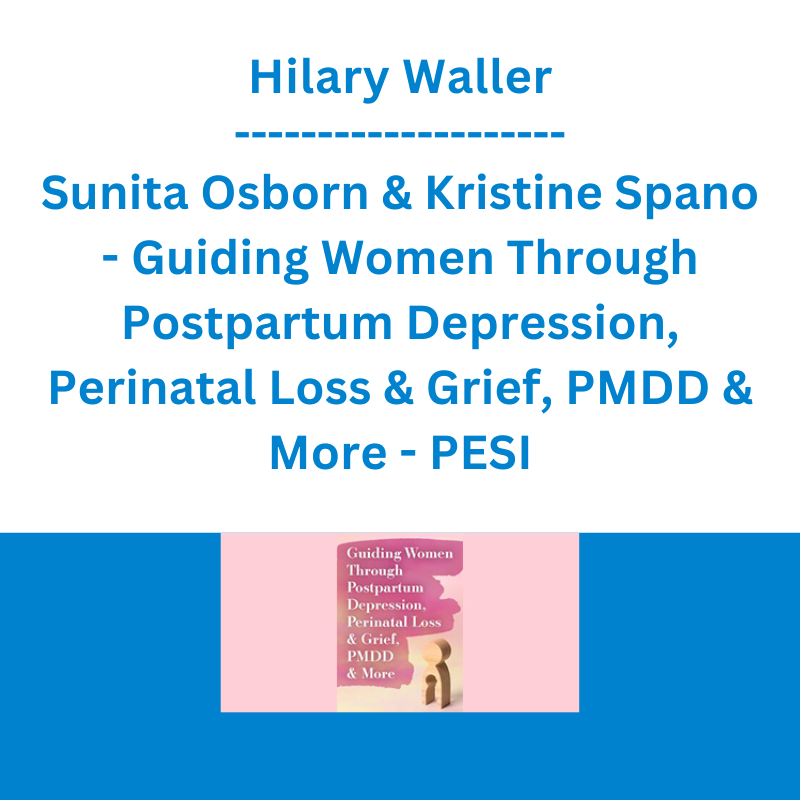*** Proof of Product ***
Exploring the Essential Features of “Hilary Waller, Sunita Osborn & Kristine Spano – Guiding Women Through Postpartum Depression, Perinatal Loss & Grief, PMDD & More – PESI”
Pregnancy, miscarriage, perinatal loss, reproductive challenges, menstrual cycle & fertility problems are often hidden by women, both in their personal lives and in front of therapists and healthcare providers.
Many of these women are seeking care for the first time… With intense feelings of shame, grief, failure, and even suicidality, they need more than an experienced clinician. They’re looking for a professional they can deeply trust.
Be the one that helps these women reconnect with their bodies, and overcome grief, PTSD, and other pain to reclaim their lives.
The first step is getting specialized training.
In this comprehensive course, you’ll get expert guidance on how to treat women’s most intimate issues. From post-partum depression and related disorders to hormone-related emotional dysregulation, you’ll learn how to:
- Distinguish the “baby blues” from serious mental health disorders
- Help clients with co-occurring PTSD, OCD & other disorders
- Integrate techniques from CBT, DBT, Cognitive Processing Therapy, Attachment-focused Therapy & more
- Identify & help clients process intense anger, shame, perceived failure & more
- Know when to refer clients to healthcare or mental health professionals
- Address your own feelings as they come up so you can stay client-focused
Grow your client and patient base on these issues and get the skills that will keep women from suffering in silence — transform your practice and your relationship with vulnerable clients.
Here’s the Essential Training You’ll Get…
Postpartum Depression & Related Disorders: Clinical Strategies to Identify and Treat Mothers Who Are Suffering in Silence
Hilary Waller, MS, LPC
Gain tools to intervene during one of the most critical and vulnerable times during a woman’s life — postpartum. In this in-depth and highly compelling training, you’ll explore…
The Clinical Profile of PMADs (Perinatal Mood and Anxiety Disorders)
- What causes postpartum mental health disorders?
- The “perinatal masquerade” and illusion of perfection
- Treat co-occurring mood disorders
- Break through guilt, shame, and silence
- Research limitations & potential risks
PMAD Screening and Assessment
- Are you asking the right questions?
- Red flags: What to look/listen for
- Evidence-based assessment tools
- Differential diagnosis:
- Depression, Anxiety, OCD, PTSD, psychosis
- The Postpartum Stress Center PMAD Response Model
- Respond to self-harm or suicidality
- Where and how to refer
Clinical Interventions for Mothers Who are Symptomatic, Exhausted, and Preoccupied
- Unique treatment factors
- Create a safe “holding environment”
- Treat co-occurring mood disorders
- Navigate scary intrusive thoughts
- Practical interventions for busy new moms
- The perinatal family: Identify and engage necessary supports
- Tools for healing the perinatal intimate partnership
- Psychotropic medications: Safe for pregnant or nursing mothers?
- Collaborative care with other providers
- Videos: Beyond the Fear & Voices of Recovery
- Exercises: Token assessment and case examples
The Nuanced Experience of the Perinatal Clinician
- Managing countertransference
- Ethical decision making: Breaking the rules and self-disclosure
- Collaboration and collegial support
Special Considerations
- Feeding issues: Breastfeeding and/or bottle
- Infertility/Assisted reproductive technologies
- Trauma, grief & loss
- NICU
- When PMADs are left untreated or present later in motherhood
- Multicultural factors
Perinatal Loss: An Attachment-Informed Treatment Framework for Helping Clients Process and Heal from Pregnancy Loss
Sunita Osborn, PsyD, MA
Learn the best interventions for treating grief after a loss and uncover the mistakes you may be making. Walk away with these career-enhancing skills in assessment, treatment planning, treatment interventions, and special considerations.
Perinatal Loss: Common Misconceptions
- Misattunement to the loss
- Far-reaching implications of reproductive trauma
- Ongoing and chronic nature of the trauma
Assessment: Exploring Clients’ Reproductive Story
- Identify red flags: grief, guilt, shame, self-blame, and hopelessness
- Explore all losses experienced
- When things take a turn: anxiety, depression, OCD
- Fully validate clients’ experience
- Sharing the Story
- Utilize relevant assessment measures
Treatment Planning for Pregnancy and Infant Loss
- Chronic trauma related to pregnancy loss
- Adapt PTSD strategies for reproductive trauma
- Address grief by utilizing the loss and restoration framework
- Help clients balance complicated grief while still trying to conceive
Treatment Interventions: Helping Clients Move Forward, Not On
- Attachment-focused approach
- Trauma-informed/PTSD adaptations
- Build resiliency with interventions based on empathy, forgiveness, and compassion
- Improve client’s relationships with partner and family
- Adapt clinical techniques for couples and group work
- Support clients in subsequent pregnancies
Clinical Considerations
- Culturally informed case conceptualizations
- Relationship to the body after a loss
- How to hold personal experience with pregnancy loss while helping clients
- Limitations and risks
Treat Pre-Menstrual Dysphoric Disorder, Premenstrual Syndrome & Emotional-Dysregulation with DBT & CBT
Kristine Spano, PsyD
Get the skills to help women when traditional pharmaceutical interventions fall short in treating the emotional rollercoaster that comes from hormonal imbalances, pre-menstrual dysphoric disorder & PMS. You’ll get the training to:
- Help women emotionally regulate with CBT & DBT skills
- Create a self-care toolbox for women
- Help women succeed in the workplace on their worst days
- Practice mindfulness exercises in your office
- Improve interpersonal relationships with distress tolerance techniques
- Understand the impact of biological changes on mental health
All with worksheets, graphs, and other information you can take with you.
Hilary Waller, MS, LPC
Hilary Waller, MS, LPC, is a psychotherapist who specializes in the treatment of perinatal mood and anxiety disorders. She is the director of education and programming at The Postpartum Stress Center outside of Philadelphia, which was founded by renowned perinatal expert Karen Kleiman and was listed in Philly Magazine as a “Center of Excellence” for maternal/fetal care in 2008. In addition to providing direct care services to individuals, couples, and groups at the center, Hilary serves as an instructor with Karen Kleiman, providing a quarterly 12 CE hour postgraduate advanced training for clinicians across the US and abroad who want to specialize in treating the perinatal population. She conducts workshops and trainings for maternal mental healthcare providers as well as non-clinical staff working with the perinatal population. Hilary completed her master’s degree in counseling psychology from Holy Family University in 2013. She is deeply honored to support new patients.
Speaker Disclosures:
Financial: Hilary Waller has an independently contracted relationship with The Postpartum Stress Center and is a consultant for FamilyWell, Inc. She receives royalties as a published author. Hilary Waller receives a speaking honorarium and recording royalties from Psychotherapy Networker and PESI, Inc. She has no relevant financial relationships with ineligible organizations.
Non-financial: Hilary Waller is a member of the American Counseling Association.
Sunita Osborn, PsyD, MA
Sunita Osborn, PsyD, MA, is a licensed clinical psychologist who practices in Houston, Texas and works with adults and couples. Known as an expert on the treatment of pregnancy loss, Dr. Osborn specializes in reproductive psychology and helps individuals and couples in all phases of the reproductive journey.
Dr. Osborn has been featured and interviewed on several different media outlets including NPR, With Whit, Psychology Today, and several miscarriage-focused platforms such as, “The Miscarriage Map: What to Expect When You are no Longer Expecting” and, “The Miscarriage Map Workbook: An Honest Guide to Navigating Pregnancy Loss, Working Through the Pain, and Moving Forward.”
Speaker Disclosures:
Financial: Dr. Sunita Osborn has employment relationships with Modern Therapy, Noula Health, and Bodily. She receives royalties as a published author. Dr. Osborn receives a speaking honorarium, recording, and book royalties from PESI, Inc.
Non-financial: Dr. Sunita Osborn is a member of the American Psychological Association.
Kristine Spano, PsyD
Dr. Kristine Spano is a licensed clinical psychologist in Pennsylvania. She maintains a private practice in Philadelphia where she treats individuals 18 and up to help manage symptoms of anxiety, trauma, depression, and other mood disorders. She gave her first talk on the application of Dialectical Behavior Therapy (DBT) in coping with PMDD for the Gia Allemand Foundation, now known as the International Association for Premenstrual Disorders, in 2018.
Dr. Spano is a graduate of The Philadelphia College of Osteopathic medicine. She earned her master’s degree from Rutgers University and her undergraduate degree in classics from Drew University in New Jersey where she graduated Summa Cum Laude.
Speaker Disclosures:
Financial: Dr. Kristine Spano has employment relationships with Rittenhouse Psychiatric Associates, Neurodiversity Consultants, LLC, and Philadelphia Nursing Home/Fairmount Long-term Care. She receives a speaking honorarium and recording royalties from PESI, Inc. She has no relevant financial relationships with ineligible organizations.
Non-financial: Dr. Kristine Spano is a member of the Philadelphia Society of Clinical Psychologists, the American Psychological Association, and the Pennsylvania Psychological Association.
Please see the full list of alternative group-buy courses available here: https://lunacourse.com/shop/










 Jesse Livermore Trading System - Joe Marwood
Jesse Livermore Trading System - Joe Marwood  Matan Feldman - The 13-Week Cash Flow Modeling - Wall Street Prep
Matan Feldman - The 13-Week Cash Flow Modeling - Wall Street Prep  George Fontanills & Tom Gentile - Optionetics 6 DVD Series Home Study Course (Digital Download)
George Fontanills & Tom Gentile - Optionetics 6 DVD Series Home Study Course (Digital Download)  Sovereign Man Confidential - Renunciation Video
Sovereign Man Confidential - Renunciation Video  Ed Ponsi - Forex Trading
Ed Ponsi - Forex Trading  Atlas API Training - API 570 Exam Prep Training Course
Atlas API Training - API 570 Exam Prep Training Course  Dave Landry - Stock Selection Course
Dave Landry - Stock Selection Course  Julie Stoian & Cathy Olson - Launch Gorgeous - Funnel Gorgeous Bundle
Julie Stoian & Cathy Olson - Launch Gorgeous - Funnel Gorgeous Bundle  Trade Like Mike - The TLM Playbook 2022
Trade Like Mike - The TLM Playbook 2022  Fred Haug - Virtual Wholesaling Simplified
Fred Haug - Virtual Wholesaling Simplified  Gina Biegel - Mindfulness-Based Stress Reduction for Teens - PESI
Gina Biegel - Mindfulness-Based Stress Reduction for Teens - PESI  SMB - Options Training
SMB - Options Training  Forexmentor - Recurring Forex Patterns
Forexmentor - Recurring Forex Patterns  Akil Stokes & Jason Graystone - TierOneTrading - Trading Edge 2019
Akil Stokes & Jason Graystone - TierOneTrading - Trading Edge 2019  Greg Loehr - Advanced Option Trading With Broken Wing Butterflies
Greg Loehr - Advanced Option Trading With Broken Wing Butterflies  Racing Workshop - Complete Online Package
Racing Workshop - Complete Online Package